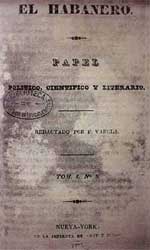
A panel led by the journalist and academic Salvador Salazar, providing a historical and critical overview of Cuban journalism during different periods of exile, transcending geographical and epochal context, yet always making manifest its emotional, political, and cultural connection to the Island.
Based on the accepted premise that there is a rich and prolonged tradition of Cuban journalism in exile–from colonial times to the present–, the panel is structured around four historical periods: colonial times, the Republican era, the onset of the Revolution, and the present. Each period will be analyzed by an expert who will address the political context, the emigrating patterns, the most relevant actors, and the tensions arising between the concepts of exile and diaspora.
The discussion will seek to answer four fundamental questions: Which audience does the exiled journalist address? What role does journalism play as an act of memory, resistance or symbolic return? How is national identity articulated from abroad? The panel features four leading figures: the priest and communicator, Fr. Rolando Montes de Oca; the scholar Edel Lima, an expert in the history of the press in Cuba under the Machado and Batista dictatorships; the journalist Waldo Fernández, who will cover media control under the Revolution; and Mónica Baró, an independent Cuban journalist, now in exile. Together they will provide a pluralistic outlook on a prevailing phenomenon–the pain of exile, which “lasts long…and yet still aches.”
The presentation will be followed by a Q&A with the audience via Zoom.
TO WATCH THE PRESENTATION, CLICK HERE ON THE SCHEDULED DATE AND TIME:
https://youtu.be/8LKHJ4F2loQ
To participate in the Q&A via Zoom AFTER the streaming, click here: https://us06web.zoom.us/j/89526024766
This presentation is part of our CreateNYC Language Access Series on Cuban History, Art, and Literature. It will be held in Spanish.
[Image above: the front page of the newspaper El Habanero, founded and published by the exiled Cuban priest and scholar Fr. Félix Varela in Philadelphia (1824-1825) and New York (1825-1826)]
This event is supported, in part, by public funds from the New York City Department of Cultural Affairs in partnership with the City Council, and made possible by the New York State Council on the Arts with the support of the Office of the Governor and the New York State Legislature.
![]()
![]()
With the promotional cooperation of Rialta, 14yMedio and Diario de Cuba

![]()
![]()